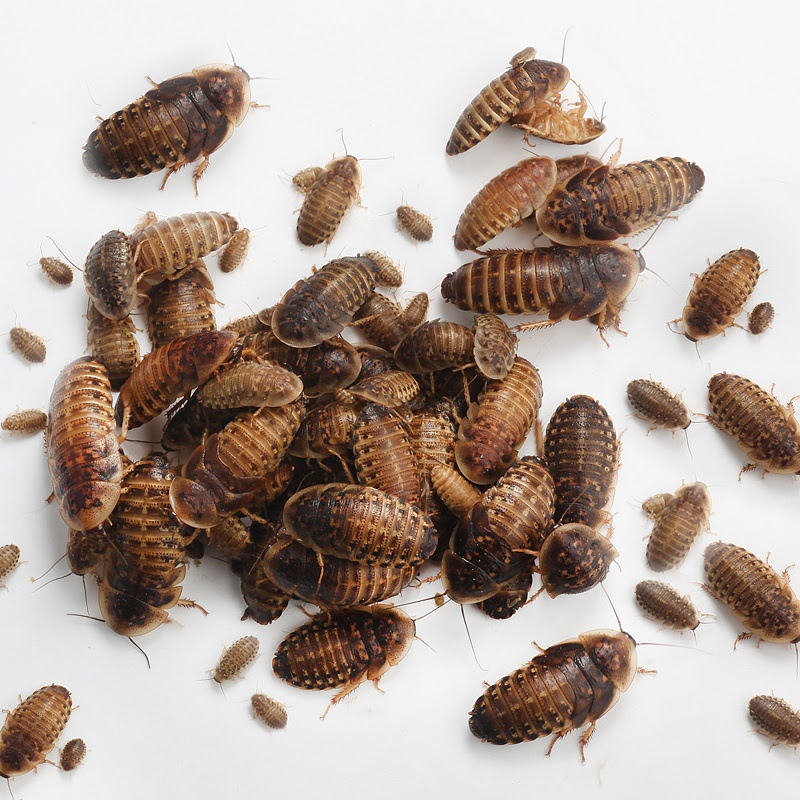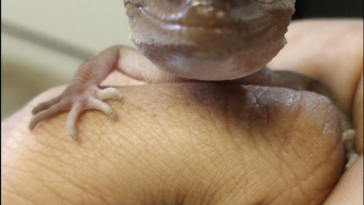feeder
Latest stories
More stories
-
445 Views3 Comments
in Featured ArticlesGecko Husbandry Changes – Part 2
We hope last week’s first installment of “Gecko Husbandry Changes” contained interesting ideas and food for thought from the experts reflecting about how they’ve changed their husbandry in the past few years. Below, another four gecko keepers share their responses. More
-
711 Views7 Comments
in Featured ArticlesBreeding Feeders in Situ
For many of us, the bugs and worms we use to feed our geckos can be considered to be almost like a second “business” what with purchasing them, housing and feeding them, and trying to keep them from escaping during the transfer from their own habitat to the geckos’. Wouldn’t it be great if we could just produce our feeders right in the geckos’ cages?
More -
4.3k Views5 Comments
in Featured ArticlesBreeding Silverfish as Feeders for Small Geckos
Thermobia domestica, also known as “silverfish” or “firebrats” is the most commonly found species of silverfish on the insect supplier’s list. They belong to the order Thysanura, one of the most primitive orders of insects, with direct ancestors in Jurassic rock layers. Todays’s species does not differ much from those ancestors.
-
736 Views1 Comment
in Featured ArticlesBreeding Large Feeder Roach Colonies
There is a plethora of conflicting information available to the exotic pet enthusiast regarding the propagation of feeder insects that only just scratches the surface of how to effectively produce them in quantities sufficient to support one’s animals. In this article I will cover the topic a bit more in depth.
I will not go into great detail with regards to temperature and humidity, or housing methods as this method is not particularly dependent on these variables. So long as your roach colony is producing this method will help you maximize production and reduce age related die-offs. More -
98 Views3 Comments
in Featured ArticlesBreeder Chronicles: January Update
Last month I wrote about the 1.3 group that I just received. Unfortunately it turned out to be a 0.4 group so I now have 8 females and 1 male which isn’t very helpful. My plans to create a Dreamsickle are on hold until I can find a Nova or Mack Snow RAPTOR male to match with the Mack Snow RAPTOR females. More
-
18.8k Views84 Comments
in Featured ArticlesHow I Got Rid of Grain Mites
There is that awful moment for those of us who keep our feeders (meal worms, crickets, superworms, etc.) in gutload grain bedding when we realize that the bedding has been infested with grain mites (Acarus siro). Although the grain mites themselves aren’t particularly harmful to feeders, geckos or humans beyond possibly causing a mild, itchy, allergic reaction, they’re nearly impossible to get rid of without discarding the bedding and, inevitably, the feeders it houses. More
-
238 Views4 Comments
in Featured ArticlesWhat’s Up With the Gecko Time Editors?
It’s generally accepted these days that collaboration is not limited by geography. With all the tools at our disposal, from the internet to skype, people can work together easily while living half a world apart. This is definitely true: Gecko Time has published regularly for two and a half years with seamless communication between its co-editors, one living in Massachusetts and one in Georgia. So how could things change with Matthew Kammerer, owner of the Gecko Time site, moving to Cambridge Massachusetts, just 5 minutes away from his co-editor, Aliza Arzt? Answer: for the better! More
-
2.6k Views52 Comments
in Featured ArticlesAttack of the Feeder Crickets
The common house cricket (Acheta domesticus) may soon be a thing of the past. The deadly Cricket Paralysis Virus (aka Acheta domestica densovirus, AdDNV) that decimated the specie in Europe around eight years ago has essentially wiped them out to near extinction here in North America as well. The feeder insect producers have not even had a chance to recover from the devastating financial losses of the mealworm shortage that wreaked havoc on the reptile community in 2008, and we are now faced with yet another feeder crisis. More
-
1.1k Views8 Comments
in Featured ArticlesEase Your Fear of Cockroaches
We all know that the cockroach is a very dirty, disgusting bug by nature. Most people are led to believe that because roaches live in sewers, dump disposals, carry disease, are small and creepy little bugs that fly, they’re no good. For some people this is true, especially if you have had a run-in with this little bug. More
-
1.4k Views33 Comments
in Featured Articles“My Gecko Will Not Eat” Part 2
In a previous article (http://geckotime.com/my-gecko-is-not-eating/ ) I described common situations, including illness, life cycle and stress, that result in geckos not eating and provided suggestions for how to deal with each case. This article addresses an even more frustrating situation: the gecko who doesn’t seem to belong to any of the categories above but continues to refuse to eat, sometimes for months. More
-
3.7k Views107 Comments
in Featured ArticlesHow to Breed Mealworms
OK here it is people: the BIG book on mealworms. I made it myself with all my photos. This is everything you need to know! my name is Heather and I have been breeding feeders for a few years including waxworms, superworms, silkworms,crickets and more! Meal worms however seem to be the biggest breeding group I have 😀 More
-
8k Views382 Comments
in Featured ArticlesMy Gecko is Not Eating: Why and How to Fix it
Failure to eat, or a reduction in eating habits in a gecko is not really a problem in and of itself, but a symptom of either an illness or a natural situation. Since most keepers consider regular feeding to be a sign of good health, it is disconcerting when a gecko doesn’t eat. Most of the time, a gecko does not eat well due to illness, stress or life cycle events. More




